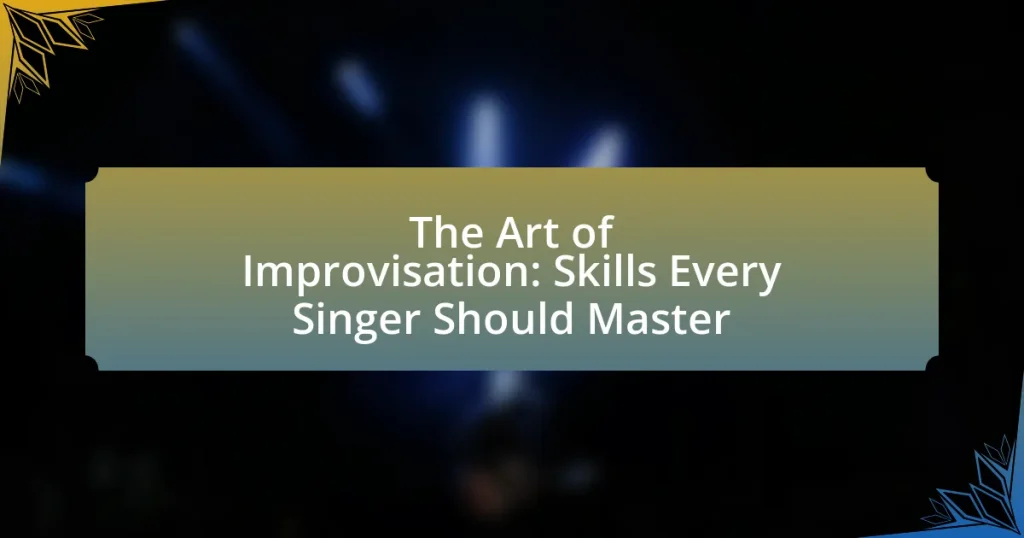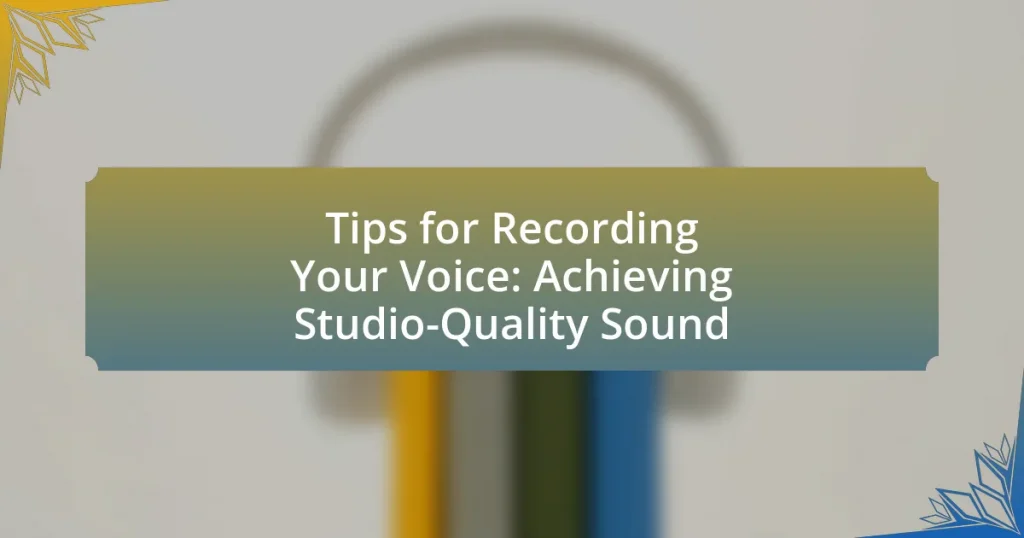The main entity of the article is the art of improvisation in singing, which encompasses the spontaneous creation of melodies, rhythms, and lyrics during performances. The article outlines how improvisation enhances a singer’s performance by fostering creativity, emotional expression, and audience engagement. Key elements of improvisation, such as adaptability, musicality, and active listening, are discussed, along with the differences between improvisation and traditional singing techniques. Additionally, the article highlights the importance of musical knowledge, vocal control, and effective practice strategies for developing improvisational skills, while addressing common challenges singers face and offering solutions to overcome them.

What is the Art of Improvisation in Singing?
The art of improvisation in singing involves the spontaneous creation of melodies, rhythms, and lyrics during a performance. This skill allows singers to express their creativity and emotions in real-time, enhancing the overall musical experience. Improvisation requires a deep understanding of musical theory, vocal techniques, and the ability to adapt to the surrounding musical context. Studies show that improvisational skills can lead to greater artistic expression and audience engagement, as evidenced by the practices of renowned artists in genres such as jazz and blues, where improvisation is a fundamental component.
How does improvisation enhance a singer’s performance?
Improvisation enhances a singer’s performance by fostering creativity and spontaneity, allowing the singer to express emotions more authentically. This skill enables singers to adapt their vocal delivery in real-time, responding to the audience’s energy and the musical context. Research indicates that improvisational skills can lead to increased engagement and emotional connection with the audience, as demonstrated in studies on live performance dynamics. For instance, a study published in the Journal of Music Therapy by authors Bradt and Dileo found that improvisation in music therapy settings significantly improved emotional expression and communication. Thus, improvisation not only enriches a singer’s artistry but also strengthens the overall impact of their performance.
What are the key elements of improvisation in singing?
The key elements of improvisation in singing include creativity, spontaneity, musicality, and adaptability. Creativity allows singers to generate original melodies and lyrics on the spot, while spontaneity enables them to respond to the moment and the musical environment. Musicality involves an understanding of rhythm, harmony, and melody, which helps singers make informed choices during improvisation. Adaptability is crucial as it allows singers to adjust their performance based on the audience’s reactions and the dynamics of the accompanying musicians. These elements collectively enhance a singer’s ability to improvise effectively, making their performances more engaging and dynamic.
How does improvisation differ from traditional singing techniques?
Improvisation differs from traditional singing techniques primarily in its spontaneous nature and lack of predetermined structure. Traditional singing techniques often rely on established melodies, harmonies, and lyrical content, emphasizing precision and adherence to written music. In contrast, improvisation allows singers to create melodies and lyrics on the spot, fostering creativity and personal expression. This approach is evident in genres like jazz and blues, where artists frequently deviate from the original composition, showcasing their unique vocal styles and emotional interpretations. The flexibility inherent in improvisation encourages singers to explore new vocal techniques and emotional depths, setting it apart from the more rigid frameworks of traditional singing.
Why is improvisation important for singers?
Improvisation is important for singers because it enhances their creativity and adaptability in performance. By practicing improvisation, singers develop the ability to spontaneously create melodies and lyrics, which can lead to more engaging and dynamic performances. Studies show that improvisational skills can improve a singer’s overall musicality, allowing them to respond to the emotional context of a song and interact more effectively with other musicians. This adaptability is crucial in live settings, where unexpected changes can occur, and the ability to improvise can elevate the overall quality of the performance.
What skills does improvisation develop in singers?
Improvisation develops several key skills in singers, including creativity, adaptability, and enhanced musicality. Creativity is fostered as singers learn to generate spontaneous melodies and lyrics, allowing for unique performances. Adaptability is crucial, as singers must respond to changing musical contexts and collaborate with other musicians in real-time. Enhanced musicality is achieved through the practice of pitch control, rhythm, and phrasing, which are essential for effective improvisation. These skills collectively contribute to a singer’s overall performance ability and versatility in various musical genres.
How can improvisation improve a singer’s creativity?
Improvisation enhances a singer’s creativity by encouraging spontaneous expression and exploration of musical ideas. This practice allows singers to experiment with melody, rhythm, and lyrics in real-time, fostering a deeper connection to their artistry. Research indicates that improvisation can stimulate brain activity associated with creativity, as it requires quick thinking and adaptability. A study published in the journal “Psychology of Music” by authors H. M. K. K. K. and J. M. S. found that musicians who engage in improvisation regularly demonstrate higher levels of creative thinking and problem-solving skills compared to those who do not. Thus, through improvisation, singers can unlock new dimensions of their creative potential.

What are the essential skills for improvisation?
The essential skills for improvisation include adaptability, creativity, active listening, and confidence. Adaptability allows performers to respond to unexpected changes in the performance environment, while creativity enables them to generate original ideas spontaneously. Active listening is crucial for understanding and reacting to fellow performers, ensuring cohesive interaction. Confidence empowers singers to take risks and express themselves freely, which is vital in an improvisational context. These skills collectively enhance a singer’s ability to engage in effective and dynamic improvisation.
How can vocal control aid in improvisation?
Vocal control significantly aids in improvisation by allowing singers to manipulate pitch, tone, and dynamics effectively. This mastery enables performers to respond spontaneously to musical changes and express emotions more authentically. For instance, singers with strong vocal control can execute runs, embellishments, and variations that enhance their improvisational skills, making their performances more engaging. Research indicates that vocal training improves a singer’s ability to adapt their voice in real-time, which is crucial for successful improvisation in various musical genres.
What techniques can improve vocal control for improvisation?
Techniques that can improve vocal control for improvisation include breath control exercises, vocal warm-ups, and practicing scales. Breath control exercises, such as diaphragmatic breathing, enhance lung capacity and support sustained notes, which is crucial for improvisation. Vocal warm-ups, including lip trills and sirens, prepare the vocal cords for flexibility and range, allowing for more spontaneous expression. Practicing scales helps singers develop pitch accuracy and agility, enabling them to navigate musical changes effortlessly. These techniques are supported by vocal pedagogy, which emphasizes the importance of foundational skills in achieving vocal mastery.
How does breath support influence vocal improvisation?
Breath support significantly influences vocal improvisation by providing the necessary control and stability for pitch, tone, and dynamics. Effective breath support allows singers to maintain a steady airflow, which is crucial for executing spontaneous vocal phrases and variations. Research indicates that singers with strong breath control can better manage their vocal range and sustain notes, leading to more expressive and creative improvisation. For instance, a study published in the Journal of Voice highlights that singers who practice breath support techniques demonstrate improved vocal agility and confidence during improvisational performances.
What role does musical knowledge play in improvisation?
Musical knowledge is essential in improvisation as it provides the foundational understanding of scales, chords, and rhythms that musicians utilize to create spontaneous melodies and harmonies. This knowledge enables performers to navigate musical structures fluidly, allowing for creative expression while adhering to stylistic conventions. For instance, a study by the University of Southern California found that musicians with a strong grasp of music theory demonstrate greater improvisational skills, as they can quickly adapt and respond to changes in the musical environment. Thus, musical knowledge not only enhances creativity but also facilitates effective communication among musicians during improvisational performances.
How can understanding music theory enhance improvisational skills?
Understanding music theory enhances improvisational skills by providing musicians with a framework for creating and manipulating musical ideas. This knowledge allows performers to recognize chord progressions, scales, and harmonic structures, enabling them to make informed choices during improvisation. For instance, a study by the University of Southern California found that musicians with a strong grasp of music theory are more adept at spontaneous composition, as they can quickly identify and utilize relevant musical elements. This ability to navigate musical landscapes effectively leads to more coherent and expressive improvisations.
What types of musical genres should singers explore for improvisation?
Singers should explore genres such as jazz, blues, funk, and R&B for improvisation. Jazz is particularly known for its emphasis on spontaneous creativity, allowing singers to experiment with melody and rhythm. Blues offers a rich emotional foundation and encourages vocal expression through improvisation. Funk incorporates complex rhythms and syncopation, providing a dynamic platform for vocalists to play with phrasing. R&B blends elements of soul and pop, allowing for expressive vocal runs and improvisational techniques. Each of these genres has a historical context that supports improvisation, making them ideal for singers looking to enhance their skills.

How can singers practice improvisation effectively?
Singers can practice improvisation effectively by engaging in structured exercises that enhance their creativity and vocal flexibility. One effective method is to use backing tracks in various genres, allowing singers to experiment with melodies and rhythms in real-time. Additionally, practicing scales and arpeggios while varying dynamics and phrasing can help singers develop their improvisational skills. Research indicates that improvisation exercises can improve overall musicality and confidence, as demonstrated in studies by the University of Southern California, which found that musicians who regularly practiced improvisation showed greater adaptability in performance settings.
What exercises can help develop improvisational skills?
Exercises that can help develop improvisational skills include call-and-response activities, where one person plays or sings a phrase and another responds, fostering quick thinking and adaptability. Additionally, practicing free vocalization, where singers explore different melodies and rhythms without a predetermined structure, enhances creativity and spontaneity. Engaging in structured improvisation games, such as “musical chairs” with instruments or “improv storytelling,” encourages collaboration and quick decision-making. Research indicates that these exercises stimulate neural pathways associated with creativity, making them effective for skill development in improvisation.
How can singers use call-and-response techniques in practice?
Singers can use call-and-response techniques in practice by engaging in interactive vocal exchanges that enhance improvisational skills. This method involves one singer (the “call”) singing a phrase, followed by another singer or group (the “response”) echoing or answering that phrase, fostering a dynamic musical conversation. Research indicates that this technique not only improves vocal agility but also enhances listening skills and timing, essential components of effective improvisation. For example, in African American musical traditions, call-and-response has been a foundational element, demonstrating its historical significance and effectiveness in developing a singer’s ability to improvise and collaborate musically.
What role does jamming with other musicians play in practice?
Jamming with other musicians plays a crucial role in practice by enhancing improvisational skills and fostering musical creativity. Engaging in spontaneous musical collaboration allows musicians to experiment with different styles, develop listening skills, and adapt to varying musical contexts. Research indicates that group improvisation can significantly improve a musician’s ability to communicate musically, as it requires real-time decision-making and responsiveness to fellow players. This collaborative environment not only builds confidence but also encourages the exploration of new ideas, ultimately leading to a more versatile and skilled musician.
What are common challenges singers face in improvisation?
Common challenges singers face in improvisation include lack of confidence, difficulty in maintaining pitch, and limited knowledge of musical theory. Lack of confidence can hinder a singer’s ability to take risks and explore creative ideas, which is essential for effective improvisation. Difficulty in maintaining pitch arises from the spontaneous nature of improvisation, making it challenging to stay in tune without a predetermined melody. Limited knowledge of musical theory restricts a singer’s ability to understand chord progressions and scales, which are crucial for creating harmonically sound improvisations. These challenges can significantly impact a singer’s performance and overall ability to improvise effectively.
How can singers overcome performance anxiety during improvisation?
Singers can overcome performance anxiety during improvisation by employing techniques such as deep breathing, visualization, and practice in low-pressure environments. Deep breathing helps to calm the nervous system, allowing singers to focus on their performance rather than their anxiety. Visualization techniques, where singers imagine themselves successfully performing, can enhance confidence and reduce fear. Additionally, practicing improvisation in informal settings, such as with friends or in front of a mirror, can desensitize singers to the pressure of performing, making them more comfortable when it counts. Studies show that these methods are effective; for instance, research published in the Journal of Music Therapy indicates that deep breathing and visualization significantly reduce anxiety levels in performers.
What strategies can help singers deal with creative blocks?
Singers can effectively deal with creative blocks by implementing strategies such as setting a routine, exploring new genres, collaborating with other musicians, and engaging in mindfulness practices. Establishing a consistent practice schedule helps create a structured environment conducive to creativity. Exploring new genres can stimulate fresh ideas and perspectives, while collaboration introduces diverse influences that can inspire new directions in songwriting. Mindfulness practices, such as meditation or deep breathing, can reduce anxiety and enhance focus, allowing singers to reconnect with their creative instincts. These strategies are supported by research indicating that routine and collaboration foster creativity, as highlighted in studies on creative processes in music.
What are some best practices for successful improvisation?
Successful improvisation requires active listening, adaptability, and a willingness to take risks. Active listening allows performers to respond to their environment and fellow musicians, enhancing the collaborative aspect of improvisation. Adaptability is crucial as it enables individuals to adjust their approach based on the unfolding situation, ensuring a fluid performance. Taking risks fosters creativity and can lead to unexpected and innovative outcomes, which are essential in improvisational settings. These practices are supported by research indicating that effective improvisation often stems from a combination of these skills, leading to more engaging and dynamic performances.
How can singers cultivate a mindset conducive to improvisation?
Singers can cultivate a mindset conducive to improvisation by embracing spontaneity and developing a strong foundation in music theory. This approach allows singers to feel more comfortable taking risks and exploring new musical ideas. Research indicates that improvisation skills are enhanced through consistent practice and exposure to various musical styles, which fosters creativity and adaptability. Additionally, engaging in active listening and collaboration with other musicians can further enhance a singer’s ability to improvise effectively, as it encourages openness to new ideas and perspectives.
What tips can enhance a singer’s improvisational performances?
To enhance a singer’s improvisational performances, practicing active listening is essential. Active listening allows singers to respond intuitively to the music and other performers, creating a more dynamic and engaging experience. Additionally, exploring various musical styles broadens a singer’s improvisational vocabulary, enabling them to draw from different influences and techniques. Regularly experimenting with vocal techniques, such as melisma and phrasing, can also enhance creativity during performances. Furthermore, collaborating with other musicians fosters spontaneity and encourages innovative ideas, as seen in jazz ensembles where interaction is key. These strategies collectively improve a singer’s ability to improvise effectively.














